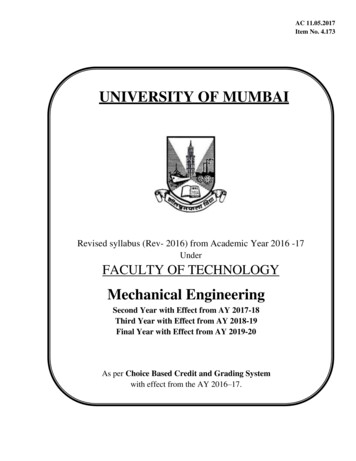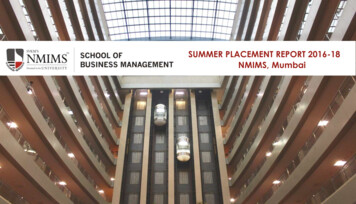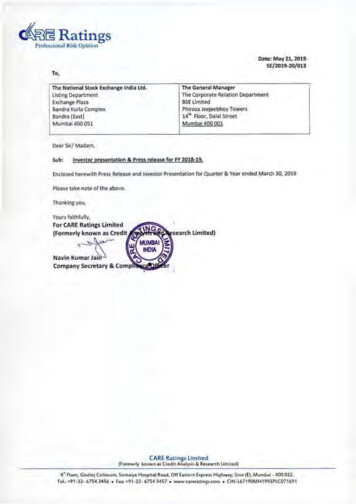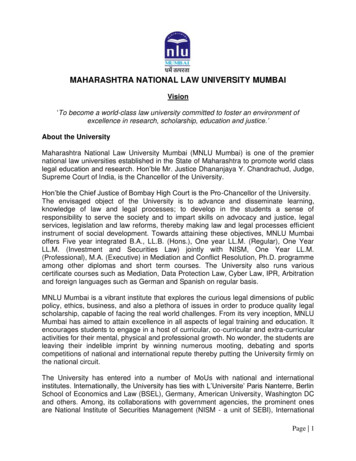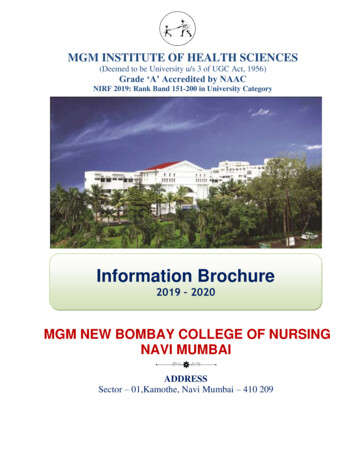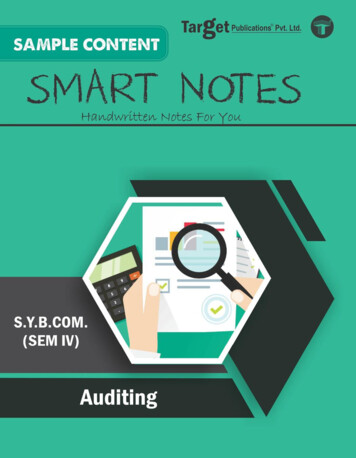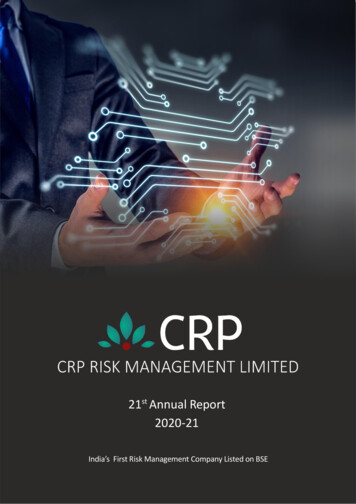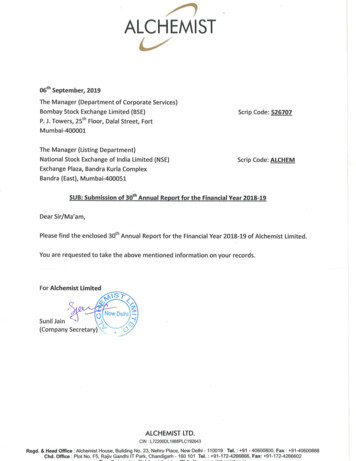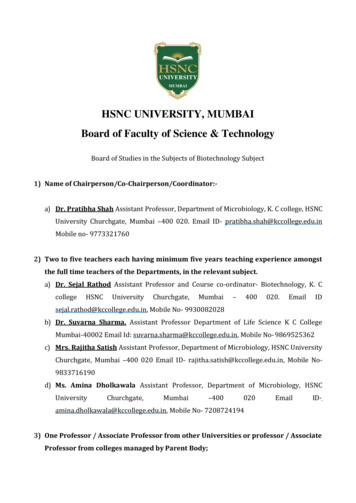
Transcription
HSNC UNIVERSITY, MUMBAIBoard of Faculty of Science & TechnologyBoard of Studies in the Subjects of Biotechnology Subject1) Name of Chairperson/Co-Chairperson/Coordinator:a) Dr. Pratibha Shah Assistant Professor, Department of Microbiology, K. C college, HSNCUniversity Churchgate, Mumbai –400 020. Email ID- pratibha.shah@kccollege.edu.inMobile no- 97733217602) Two to five teachers each having minimum five years teaching experience amongstthe full time teachers of the Departments, in the relevant subject.a) Dr. Sejal Rathod Assistant Professor and Course co-ordinator- Biotechnology, K. mailIDsejal.rathod@kccollege.edu.in, Mobile No- 9930082028b) Dr. Suvarna Sharma, Assistant Professor Department of Life Science K C CollegeMumbai-40002 Email Id: suvarna.sharma@kccollege.edu.in, Mobile No- 9869525362c) Mrs. Rajitha Satish Assistant Professor, Department of Microbiology, HSNC UniversityChurchgate, Mumbai –400 020 Email ID- rajitha.satish@kccollege.edu.in, Mobile No9833716190d) Ms. Amina Dholkawala Assistant Professor, Department of Microbiology, ina.dholkawala@kccollege.edu.in, Mobile No- 72087241943) One Professor / Associate Professor from other Universities or professor / AssociateProfessor from colleges managed by Parent Body;
4) nominated by Parent Body;a) Dr.Tara Menon Co-ordinator, Department of Biotechnology, S.I.E.S. college Mumbai400 022 Email ID- taramenon47@gmail.com Mobile No- 9820414261b) Mr. Chetan Ramesh Patil Coordinator Department of BiotechnologyR D National College Mumbai- 400050 Email ID – chetanrpatil86@gmail.comMobile no- 9820553785) Four external experts from Industry / Research / eminent scholar in the fieldrelevant to the subject nominated by the Parent Body;a) epartmentofBiotechnology, Former-HOD, Department of Microbiology, K.C. College, Mumbai400020 Email ID – jaya2016@gmail.com Mobile no- 9892619365b) Dr. Anu Ghosh(Eminent Scholar) Scientific Officer ‘G’, BARC, Mumbai-42130 Email ID– anug.barc@gmail.com Mobile no-9757112551c) Mr. Ali Asgar Dholkawala (Industry Expert) Senior Manager Legal, Novi ilID–aliasgar.dholkawala@gmail.com, Mobile no- 9820270720d) Dr. Sukendu Ghosh(Research and Industry Expert) Scientific Officer ‘G’, BARC,Mumbai-421306 Email ID – ghoshsukh@gmail.com Mobile no- 9321681400e) Mr. Ramlal Moorjani (Eminent Scholar) Retired .professor Department of Chemistry,K.C. College, Mumbai- 400020 Email ID –ramlalkc@rediffmail.com Mobile no-98202497995.) Top rankers of the Final Year Graduate and Final Year Post Graduate examination ofprevious year of the concerned subject as invitee members for discussions on framing orrevision of syllabus of that subject or group of subjects for one year.a) d-dubeshubhankar@gmail.com Mobile no- 9833322379b) l.com Mobile no- 981978996student16-17)EmailID-
Part –IOutline of Choice Based Credit System as outlined by University GrantsCommission:R. **** : The Definitions Of The Key Terms Used In The Choice Based Credit SystemAnd Grading System Introduced From TheAcademicYear2020-2021AreAs Under:1.Core Course: Acourse, which should compulsorily be studied by a candidate asacorerequirement is termed as a Corecourse.2.Elective Course: Generally, a course which can be chosen from a pool ofcourses and which may be very specific or specialized or advanced orsupportive to the discipline/subject of study or which provides an extendedscope or which enables an exposure to some other discipline/subject/domainor nurtures the candidate's proficiency/skill iscalledan Elective Course.2.1 Discipline Specific Elective (DSE) Course: Elective courses may beoffered by the main discipline/subject of study is referred toas Discipline Specific Elective. The University/Institute may alsoofferdiscipline related Elective courses of interdisciplinary nature (tobeofferedby main discipline/subject of study).2.2 Dissertation/Project: An elective course designed to acquirespecial/advanced knowledge, such as supplement study/support studyto a project work, and a candidate studies such a course on his own withan advisory support by a teacher/faculty member is calleddissertation/project. A Project/Dissertation work would be of 6 credits.A Project/Dissertation work may be given in lieu of adiscipline specificelective paper.2.3 Generic Elective (GE) Course: An elective course chosen generallyfrom an unrelated discipline/subject, with an intention to seek exposureis called a Generic Elective.P.S.: A core course offered in a discipline/subject may be treated as anelective by other discipline/subject and vice versa and such electives mayalso be referred to as Generic Elective.3.Choice Base Credit System : CBCS allows students to choose interdisciplinary, intra-disciplinary courses, skill oriented papers (even from otherdisciplines according to their learning needs, interests and aptitude) and moreflexibility for students.
4.Honours Program : To enhance employability and entrepreneurship abilitiesamong the learners, through aligning Inter Disciplinary / Intra Disciplinarycourses with Degree Program. Honours Program will have40 additional credits to be undertaken by the learner across three yearsessentially in Inter / Intra Disciplinary course.A learner who joins Regular Undergraduate Program will have to opt forHonours Program in the first year of the Program. However, the credits forhonours, though divided across three years can be completed within threeyears to become eligible for award of honours Degree.5.Program: A Program is a set of course that are linked together in anacademically meaningful way and generally ends with the award of a DegreeCertificate depending on the level of knowledge attained and the total durationof study, B.Sc. Programs.6.Course: A 'course' is essentially a constituent of a 'program' and may beconceived of as a composite of several learning topics taken from a certainknowledge domain, at a certain level. All the learning topics included in acourse must necessarily have academic coherence, i.e. there must be a commonthread linking the various components of a course. A number of linked coursesconsidered together are in practice, a 'program'.7.Bridge Course: Bridge course is visualized as Pre semester preparation by thelearner before commencement of regular lectures. For each semester the topics,whose knowledge is considered as essential for effective and seamless learningof topics of the Semester, will be specified. The Bridge Course can be conductedin online mode. The Online contentcanbecreated for the Bridge Course Topics.8.Module and Unit: Acourse which is generally an independent entity having itsown separate identity, is also often referred to as a 'Module' in today's parlance,especially when we refer to a 'modular curricular structure'. A module may bestudied in conjunction with other learning modules or studied independently. Atopic within acourseistreated asa Unit. Each course should haveexactly 3 Units.9.Self-Learning: 20% of the topics will be marked for Self-Learning. Topicsfor Self-Learning are to be learned independently by the student, in a timebound manner, using online and offline resources including online lectures,videos, library, discussionforums, fieldwork, internships etc.Evaluative sessions (physical/online), equivalent to the credit allocation of theSelf Learning topics, shall be conducted, preferably, every week for each course.Learners are to be evaluated real time during evaluative sessions. The purposeof evaluative sessions is to assess the level of the students' learning achieved
in the topicsearmarked for Self-Learning.The teacher's role in these evaluative sessions will be that of a Moderator andMentor, who will guide and navigate the discussions in the sessions, and offerconcluding remarks, with proper reasoning on the aspects which mayhave beenmissed by the students, in the course of the Self-Learning process.The modes to evaluate self-learning can be a combination of the variousmethods such as written reports, handouts with gaps and MCQs, objectivetests, case studies and Peer learning. Groups can be formed to present selflearning topics to peer groups, followed by Question and Answer sessions andopen discussion. The marking scheme for Self Learning will be defined underExamination and Teaching.The topics stipulated for self-learning can be increased or reduced as per therecommendations of the Board of Studies and Academic Council from time totime. All decisions regarding evaluation need to be taken and communicated tothe stakeholders preferably before the commencement of a semester. Someexceptions may be made inexigencies, like the current situation arising from thelockdown, but such ad hoc decisions are tobe kept to the minimum possible.
10.Credit Point: Credit Point refers to the 'Workload' of a learner and is an index ofthe number of learning hours deemed for a certain segment of learning. Theselearning hours may include a variety of learning activities like reading,reflecting, discussing, attending lectures / counseling sessions, watchingespecially prepared videos, writing assignments, preparing for examinations,etc. Credits assigned forasingle course always pay attention to how many hoursit would take for a learner to complete a single course successfully. A singlecourse should have, by and large a course may be assigned anywhere between2 to 8 credit points wherein 1 credit is construed as corresponding toapproximately 30 to 40 learning hours.11.Credit Completion and Credit Accumulation: Credit completion or Creditacquisition shall be considered to take place after the learner has successfullycleared all the evaluation criteria with respect to a single course. Thus, a learnerwho successfully completes a 4 CP (Credit Point) course may be considered tohave collected or acquired 4 credits. learner level of performance above theminimum prescribed level (viz. grades / marks obtained) has no bearing on thenumber of credits collected or acquired. A learner keeps on adding more andmore credits as he completes successfully more and more courses. Thus thelearner 'accumulates' course wise credits.12.Credit Bank: A Credit Bank in simple terms refers to stored and dynamicallyupdated information regarding the number of Credits obtained by any givenlearner along with details regarding the course/s for which Credit has beengiven, the course-level, nature, etc. In addition, all the information regarding thenumber of Credits transferred to differentprograms or creditexemptions givenmay also bestoredwiththeindividual's history.13.Credit Transfer: (performance transfer)When a learner successfullycompletesa program, he/she is allowed to transfer his/her past performance to anotheracademic program having some common courses and Performance transfer issaidtohave taken place.14.Course Exemption: Occasionally, when two academic programs offered by asingle university or by more than one university, may have some common orequivalent course-content, the learner who has already completed one of theseacademic programs is allowed to skip these 'equivalent' courses whileregistering for the newprogram. The Learner is 'exempted' from'relearning' thecommon or equivalent content area and from re-appearing for the concernedexaminations. It is thus taken for granted that the learner has already collectedin the past the creditscorrespondingto the exempted courses.
Part-IIO***** The fees for transfer of credits or performance will be based on number ofcredits that a learner has to complete for award of the degree.The Scheme of Teaching and Examination:The performance of the learners shall be evaluated in two components: InternalAssessment with 40% marks by way of continuous evaluation and by Semester EndExamination with 60% marks by conducting the theory examination.INTERNAL ASSESSMENT:‐ It is defined as the assessment of the learners on thebasis of continuous evaluation as envisaged in the credit based system by way ofparticipation of learners in various academic and correlated activities in thegiven semester of the programme.A). Internal Assessment – 40%40 marksPractical’s (internal Components of the Practical Course1.For Theory CoursesSr.No.ParticularsMarks1ONE class test / online examination to be conducted inthe given semester15 Marks2One assignment based on curriculum (to be assessed by theteacher Concerned10 Marks3Self-Learning Evaluation10 Marks4Active participation in routine class instructional deliveries05 Marks
2. For Courses with PracticalsEach practical course can be conducted out of 50 marks with 20 marks for internal and 30 marks for externalPractical’s (Internal component of the Practical Course)Sr. No1Evaluation typeTwo Best Practicals /Assignments/Presentation /Preparation of models/ ExhibitsOr23One Assignment/ project/presentation to be assessed by teacher concernedJournalVivaMarks100505The semester end examination (external component) of 60 % for each course will be as follows:i)Duration – 2 Hours ii) Theory Question PaperPattern:-1.2.3.There shall be four questions each of 15 marks. On each unit there will be one question and the fourthone will be based on entire syllabus.All questions shall be compulsory with internal choice within the questions. (Each question will be of20 to 23 marks with options.)Question may be subdivided into sub-questions a, b, c and the allocation of marks depend on theweightage of the topic.The marks will be given for all examinations and they will be converted into grade (quality) points. Thesemester-end, final grade sheets and transcripts will have only credits, grades, grade points, SGPA and CGPA.
3. Project and Assignment: Project or Assignment, which can in the following forms Case Studies Videos Blogs Research paper (Presented in Seminar/Conference) Field Visit Report Presentations related to the subject (Moot Court, Youth Parliament, etc.) Internships (Exposition of theory into practice) Open Book Test any other innovative methods adopted with the prior approval ofDirector Board of Examination and Evaluation.4.Self-Learning Evaluation 20% OF THE TOPICS OF CURRICULUM ARE LEARNED BY THE STUDENTTHROUGH SELF LEARNING USING ONLINE / OFFLINE ACADEMICRESOURSE SPECIFIED IN THE CURRICULUM. HENCE 20% OF THE LECTURES SHALL BE ALLOCATED FOR EVALUATIONOF STUDENTS ON SELF LEARNING TOPICS The identified topics in the syllabus shall be learnt independently by the students in a timebound manner preferably from online resources. Evaluative sessions shall be conducted bythe teachers and will carry 10 Marks.CLUB The self-learning topics into 3-4 GROUPS OF TOPICS ONLY FOREVALUATION. PRESCRIBE TIME DURATION (IN DAYS) FOR COMPLETION OF EACH GROUPOF TOPIC AND EARMARK SELF LEARNING EVALUATION LECTURES IN THETIMETABLE. HENCE EACH GROUP OF TOPIC CAN BE ASSIGNED 3 REGULARLECTURES FOR THIS EVALUATION FOR ENTIRE CLASS3 Sub TopicsEach evaluative session shall carry 3 Marks (3 x 3 Units 9 Marks). Students whoparticipate in all evaluative sessions shall be awarded 1 additional Mark.4 Sub TopicsEach evaluative session shall carry 2.5 Marks (2.5 x 4 Units 10 Marks) EVALUATION OF SELF LEARNING TOPICS CAN COMMENCE IN REGULARLECTURES ASSIGNED FOR SELF LEARNING EVALUATION IN THETIMETABLE3 Evaluative sessionsEach evaluative session shall carry 3 Marks (3 x 3 9 Marks). Students who
participate in all evaluative sessions shall be awarded 1 additional Mark.4 Evaluative sessionsEach evaluative session shall carry 2.5 Marks (2.5 x 4 10 Marks).Methods for Evaluation of Self-learning topics: Seminars/presentation (PPT or poster), followed byQ&A Objective questions /Quiz / Framing of MCQquestions. Debates Group discussion You-Tube videos (Marks shall be based on the quality andviewership) Improvisation of videos Role Play followed by question-answersTEACHERS CAN FRAME OTHER METHODS OF EVALUATION ALSO PROVIDEDTHAT THE METHOD, DULY APPROVED BY THE COLLEGE EXAMINATIONCOMMITTEE, IS NOTIFIED TO THE STUDENTS AT LEAST 7 DAYS BEFORE THECOMMENCEMENT OF THE EVALUATION SESSION AND IS FORWARDED FORINFORMATION AND NECESSARY ACTION AT LEAT 3 DAYS BEFORE THECOMMENCEMENT OF THE EVALUATION SESSION Viva Voce Any other innovative methodSEMESTER END EXAMINATION: ‐ It is defined as the examination of the learnerson the basis of performance in the semester end theory / written examinations.B. Semester End Examination- 60 %60 MarksDuration – These examinations shall be of 2 Hours duration.Question Paper Pattern: ‐i.There shall be four questions each of 15 marks. ii.Allquestions shall be compulsory with internal choice within thequestions.iii. Question may be sub‐divided into sub‐questions a, b, c, d & e only and theallocation of marks depends on the weightage of the topic.THE MARKS OF THE INTERNAL ASSESSMENT SHOULD NOT BE DISCLOSED TO THESTUDENTS TILL THE RESULTS OF THE CORRESPONDING SEMESTER IS DECLARED.1)2)
HSNC University Mumbai(2020-2021)Ordinances and RegulationsWith Respect toChoice Based Credit System(CBCS)For the Programmes UnderThe Faculty of Science and TechnologyFor the CourseBiotechnologyCurriculum – First Year Undergraduate ProgrammesSemester-I and Semester -II2020-2021
BiotechnologyPart 1- PreambleThe world today is living and benefiting from the present ‘Era of Biotechnology’. Biotechnology isone of the recent branches of Life Sciences, which has extended and built up as a progressedmultidisciplinary applied science in most recent couple of years. Biotechnology at its heart conceivesa far reaching investigation of the building blocks of life and this has prompted a novel status forBiotechnology in research and industry.The financial capability of Biotechnology is settled which has nearly gotten synonymous with currentimprovement. Biotechnology has its applications in pretty much every field contacting basically everyhuman action. Applied Biotechnology is presently a work in press finding applications in Industry,Agriculture, Health and Environment.Biotechnology necessitates well trained and duly skilled individuals to constitute Industry andResearch divisions. The field is novel and thus requests contributions to Infrastructure andTechnology from all fields. The worldwide focus is now growing around inventions that can ease lifeand purpose. Biotechnology is destined to introduce a paradigm shift in the world’s technologies andhuman perspective.The interest for prepared workforce in Biotechnology is regularly developing in FundamentalResearch and Industry Sector. Scholastic and Research Sectors likewise require interdisciplinaryprepared labor to facilitate the Biotechnology Revolution.The need of great importance is to configure a prospectus which keeps pace with changing occasionsand innovation with stresses on applications while clarifying innovation top to bottom. The presentsyllabus is drafted foreseeing the future needs of Biotechnology Sector with more accentuation ongranting hands-on aptitudes. The central purpose is laid on making schedule perfect withimprovements in academics, research and commercial divisions. The theory and practical courseintroduced will prompt range of abilities to advance Biotechnology Sector.The rebuilt prospectus consolidates fundamental knowledge of Physics, Chemistry and Biologyconsidering headways in innovation. The educational program plans to grant essential informationwith accentuation on its applications to prepare the understudies businessTo comply with the education policy of Government of India, we have included Online Courses(OLC) which is available on NPTEL or SWAYAM portals under MOOCS programme beingdeveloped by MHRD. The online courses would inculcate the habit of self-study at their own pace bythe students and also acclimatize them to future technologies of learning processes.
1. Course Objectives:Semester IUS-FBT-101Biotechnology: Introduction and applications Introduction to the fields of Biotechnology, its scope, and its application in thefield of agriculture and food biotechnology Developing a good perspective of the field of Biotechnology and ethical issuesrelated to biotechnology Introducing the concept of Bioinformatics. Understanding principles underlying design of Fermenter and FermentationProcessUS-FBT-102Genetics and molecular biology (FBT102) The objective of this course is to develop a firm foundation with concepts inheredity and variation Develop an understanding of the eukaryotic and prokaryotic genetics. Discuss the structure of Chromosomes and types of Chromosomal Aberrations.US-FBT-103Cell: Ultra structure and Signaling (FBT103) The objective of this course to familiarize the students with ultra-structure ofboth prokaryotic and eukaryotic cells Be able to differentiate between prokaryotes and eukaryotes Develop an understanding of the Cytoskeleton and Cell Membrane Understanding the signaling process in bacteria and plants.US-FBT-104Microscopic examination, nutrition and control of Micro-organisms (FBT 104) The objective of this course is to impart skill in handling and culture ofMicroorganisms and acquaint them with various types of stains and stainingmethods to be used for visualization of specimens using a microscope Develop skills associated with laboratory techniques viz. sterilization, microbialcell culture & cell lines techniques, microscopy and staining techniques to viewspecimens under a microscope.
US-FBT-105Basic ChemistryThe objective of this course is to acquaint students with basic concepts ofChemistry like Classification and Nomenclature of organic compounds.To build concepts in Stereochemistry by providing an understanding of therelative spatial arrangement of atoms in molecules. To help students understandthe types and significance of chemical bonds.Be able to understand Stereochemistry of organic molecules and their practicalsignificanceDevelop an understanding about the nature and role of chemical bonds in theformation of compounds.US-FBT-106Biomolecules The objective of this course is to provide a clear understanding ofClassification, Structure and Characterization of Biomolecules. To impart knowledge related to biological role of all major Biomolecules. Develop an understanding about Carbohydrates, proteins, amino acids, lipidsand nucleic acids.US-FBT-107Societal Awareness The objective of this course is to acquaint the students with concepts ofSocietal Awareness Develop a sense of awareness about the Problems in Society
Semester IIUS-FBT-201Tissue Culture techniques The objective of this course is to have an insight about the basic concepts inPlant and Animal Tissue Culture Develop an understanding of Plant and Animal Tissue Culture Develop basic skills required to carry out these techniquesUS-FBT-202Genetic engineering The objective of this course is to provide an understanding of the basic molecularprocesses of a cell at the level of its genome Develop an understanding of recombinant DNA technology and its applications Discuss the principles of various techniques in molecular biology and itsapplication.US-FBT-203Physiology (Plants and animals) and Ecology The objective of this course to acquaint students with Physiological Processes inPlants and Animals as well as to study the role of the ecosystem and the variousinteractions that sustains it. Develop an understanding of the different physiological processes in theeukaryotic living system viz. Plants, animals Discuss the importance of the various interactions of the ecosystem. Students will become aware of advanced techniques like remote sensing that areused for animal and plant protection.US-FBT-204Genetics & immunology The objective of this course is to offer an understanding of the concept ofPopulation Genetics and to provide a basic understanding of antibodies, antigensand role of immune system Develop an understanding of various concepts of genetic variations inpopulations and the role of population genetics in Conservation Biology. Understand the role of immune system. Understand how to identify and classify mutations in DNA followed bymechanism of DNA repair
US-FBT-205Analytical Chemistry The objective of this course is to train the student in the principal, working andapplications of basic Analytical Techniques like Chromatography andColorimetry Be able to understand and use two common and significant analytical techniquesviz. Chromatography and Colorimetry Students will learn how to make solutions, buffers and perform titrimetricanalysis.US-FBT-206Physical Chemistry The objective of this course to acquaint students with fundamentals in Oxidationand Reduction Reactions, reaction rates Develop an understanding of kinetics involved in various types of chemicalreactions Be able to distinguish reactions involving oxidation and reduction processes.US-FBT-207Globalization, Ecology and Sustainable Development The objective of this course is to acquaint the students with concepts ofGlobalization, Ecology and Environment Understand the concept of sustainable development Impart knowledge of Globalization to make students aware about the Problemsin Society2. Process adopted for curriculum designing:The curriculum was designed in a stepwise manner, firstly on the basis of feedbackobtained from department teachers and students. Later several meetings wereconducted with representatives from academia, industries and research institutions toassure that the syllabus is enriched in all the aspects.3. Salient features, how it has been made more relevant.While designing of the syllabus, care has been taken to balance biotechnologicaltechniques with entrepreneurship skills .The course would help the students to developcreativity in designing products and build research skills and provide betteremployment opportunities in areas like health care, agriculture, industry andenvironment.
4. Learning Outcomes.Our program is designed in a way to educate the learner about various fields ofBiotechnology like Genetics, Medical Microbiology and Diagnostics, pharmaceuticalindustry, Industrial biotechnology, molecular, environmental and biotechnology. Theprogram would help the learner to apply their biotechnological and microbiologicalskills to summarize, analyze, and instill problem solving approach in the latestdevelopments and innovations in the future. The program design, the teaching and theevaluation patterns would help the learner to develop analytical and critical thinkingskills in biological problems through scientific methods so as to give the learner a solidfoundation in the field of Biotechnology.1. Learners shall analyze and solve process systems problems, particularly thoserelated to equipment performance, fluid flow, and balance of material andenergy.2. The Program would enable the Students to communicate orally and in writingusing suitable scientific terms.3. During the Course of this Program Students will be able to design and conductexperiments, analyze and interpret data to address issues in biotechnology andrelated fields.4. Students will be capable to understand the potential and impact ofbiotechnological innovations on the environment and their implementation inorder to find a sustainable solution to environmental, health, agricultural andother issues.5. The course will cater the students with essential concepts of different processesinvolved in development of animals, along with genetic control of development.6. The course will acquaint the Students with Complete knowledge on how genesare transmitted in plants and animals from one generation to another will beimparted after completion of the course on genetics. The course shall alsohighlight the role of genetics / mutations in the breeding of animals and plants7. The Program shall further build into the Learners the ability to develop, interpret,and critically evaluate modern scientific research approaches. As alsoUnderstanding the relationship between society and science and justifying plant,animal and microorganism biotechnological manipulation.8. Students would be equipped with knowledge and understanding of basic skillsin laboratory techniques viz. sterilization, microbial cell culture & cell linestechniques, microscopy and staining techniques to view specimens under amicroscope9.
5. Input from stakeholdersNew topics introduced at basic level which will be gradually included in moredepth in second and third year B.Sc. Existing components were modified andshuffled from one semester to other on the basis of time frame required tocomplete the particular paper. As suggested by the industrial, research andacademic experts, practical applications of the fundamental techniques wereincorporated and missing links between different subtopics were introduced .Subtopics more streamlined and were made specific (depth of the content).Newly introduced concepts like IPR and Bioinformatics were suggested byindustry expert. As suggested by academic experts, new topics such as Pedigreeanalysis, structure of chromosomes and variation in chromosome structure andnumber were introduced to the students at this basic level as they directly startstudying in depth in second year B.Sc. Also, a missing section of molecularmotor proteins, signalling through enzyme coupled cell surface receptors andsignaling in bacteria, different PTC techniques, introduction to fundamentaltechniques in molecular biology and its application in molecular biology wereadded. As suggested by research and industrial expert, Industrial relatedtechniques, Equipment, Instruments used in basic tissue culture were introduced.Also in recombinant DNA technology topic such as vectors, cDNA library,applications of rDNA technology were added as these are currently used inresearch and R&D departments of industries. To
college HSNC University Churchgate, Mumbai - 400 020. Email ID sejal.rathod@kccollege.edu.in, Mobile No- 9930082028 b) Dr. Suvarna Sharma, Assistant Professor Department of Life Science K C College Mumbai-40002 Email Id: suvarna.sharma@kccollege.edu.in, Mobile No- 9869525362

